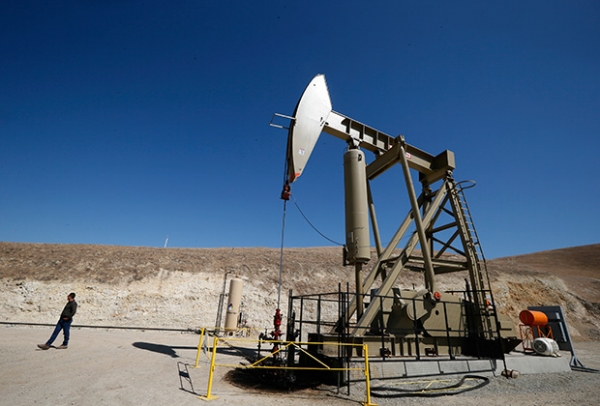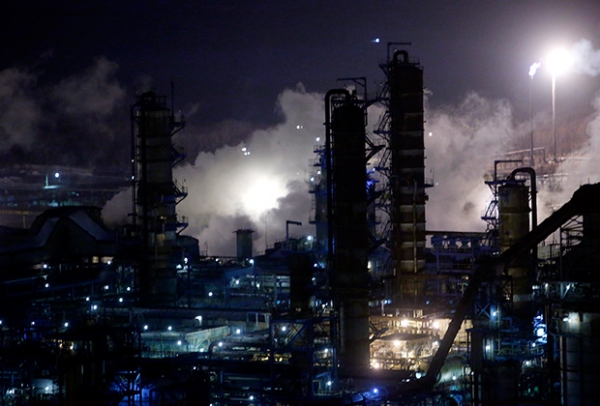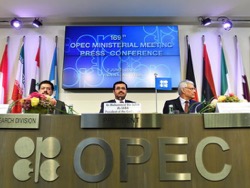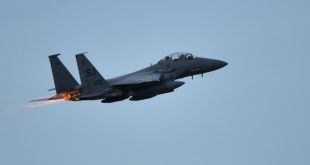
As the agreement of Russia and OPEC will have an impact on the ruble exchange rate
Russia and several OPEC members decided to freeze oil production to prevent further price declines. The market reaction to the agreement was the opposite — Brent immediately fell. “Ribbon.ru” understood how the agreement between OPEC and Moscow will affect the future rate movements.
The Union of the barrel and the tower
Russia and Saudi Arabia agreed. On February 16 in Qatar hosted a meeting of energy Minister Alexander Novak and representatives of the Organization of countries-exporters of oil (OPEC), which, in particular, was attended by Saudi oil Minister Ali al-Nuaimi and his Qatari counterpart Mohammed bin Saleh al-the Garden.
The meeting has decided to freeze oil production. It is noteworthy that the decision that nothing is fixed. Moreover, the representative of the Ministry of oil of Qatar reported that the agreement will start to operate only after all members of the OPEC will approve it. Al-Nuaimi expressed the hope that the pliancy of the cartel members.
More interested in the Venezuela agreement. In January, Bolivarian Republic asks Russia for assistance in organizing emergency OPEC meeting; 11 February, the oil Minister of Venezuela, Eulogio del Pino has proposed to freeze production of black gold. No wonder his country suffered from a collapse of quotations of the strongest of all, the population is on the verge of starvation (their own agricultural production has fallen by 90 percent, and for food imports need a stable flow of petrodollars), already entered a state of emergency. Bloomberg acknowledged the economy of Venezuela is the most miserable in the world, and the IMF predicts that in 2016 the prices will increase by 720 percent. In addition, the difference between the official rate of the Bolivar and its value on the black market reached 10 000 percent. The last hope for Venezuela — expensive oil.
Russia and Saudi Arabia are also interested in the growth of oil prices. The situation in these countries is definitely not as critical as in Venezuela, however, both States are looking for ways to Supplement their budgets. Recall: in 2016 the gap between income and expenditure of the Russian Treasury (based on an oil price of 50 dollars), according to preliminary estimates, will amount to a 2.36 trillion rubles, or about $ 30 billion at the current exchange rate. The Saudis adopted a budget with a deficit of 87 billion dollars.
“Following the meeting, four countries — Russia, Saudi Arabia, Qatar and Venezuela — are willing to freeze oil production at the January level, if other manufacturers will join this initiative”, — have informed in Russian the Ministry of energy.
The reaction of the markets
By itself, the information about the preparation of the meeting in Qatar fueled quotes. The news of the talks emerged on 15 February. February 11, the reference mark Brent cost 30,06 dollar; four days later the price jumped up to 34,45 dollars, but directly during the meeting, Russia and the OPEC have reached 35,50 USD. Thus, within a few days of North sea grade rose by 18 percent.

Photo: Lucy Nicholson / Reuters
Senior analyst at Alfa-Bank Alan Kaziev said that February 16 will be a “day oil”. “In the market today “day oil”. If “defensive assets” (gold and silver) are losing on average more than 3 per cent, in the crude oil market WTI and Brent rose by 4.4 and 3.9 percent, respectively. Against this background, the ruble should continue previously taken the course of strengthening”, — he predicts (quoted by Rambler News Service).
However, the first market reaction was opposite. Brent left his position at $ 35, and rushed down — to 33,73 dollar per barrel. Immediately the U.S. dollar exchange rate against the Russian began to grow. Trading session started with a mark of 75,96 rubles, then the dollar rose to 77,32 ruble. The Euro hit 86,52 ruble (all data at 13:15 GMT).
Apparently, the players are disappointed with the outcome of the Qatar meeting. They were clearly waiting for more. Namely, reduction of production, which is constantly growing. According to various estimates, the market is oversupply of 1.5-2 million barrels per day. Oil is not in demand — and this is one of the factors that exerts considerable pressure on prices. And the agreement does not solve the problem, but merely preserves it.
According to the latest information from OPEC, the production within the cartel was a record: 32,34 million barrels a day. Russia has also increased production to 10,88 million barrels per day is a maximum since the times of the USSR.
To quote rose, you need to reduce the volume of pumping black gold, but no one is going to do. Ali al-Nuaimi at the end of 2014 sharply opposed the decrease of the production: “If I cut production, what will happen to my market share? Not in the interest of OPEC to cut production. No matter how much will oil cost — 20, 40, 50 or 60 dollars.”

Photo: Sergei Karpukhin / Reuters
Don’t forget about Iran. With the Islamic Republic not so long ago, lifted the sanctions, and now she intends to actively trade in hydrocarbons. The country wants to fill in for the market is still a million barrels a day. On 17 February, the negotiations to be held with representatives of Tehran. The outcome of the meeting largely depends the future of the oil market.
Every man for himself
Experts interviewed “Tape.ru”, doubt that the contract of Russia with some members of OPEC will lead to large price shifts.
The partner of company RusEnergy Mikhail Krutikhin noted that the agreement is essentially a statement about the current state of Affairs and, accordingly, will have no impact on the stock. “In fact, Russia and Saudi Arabia have expressed mutual respect. Nothing more of the Treaty means”, — said the expert. According to him, the Russian Federation and without that can’t increase production, because at current prices is unprofitable to invest in the development of new deposits. With regard to exports, Moscow will have to increase because domestic consumption falls.
Riyadh is not going to increase production, so as to expand in the market it is enough of what is being pumped now. “The Saudis do not act by increasing the volume as well by providing discounts on the sale, to increase production they do not need”, — said Mikhail Krutikhin. He noted that Iran is unrealistic to agree: “Now every man for himself”. According to the calculations of RusEnergy, in the next two years the average annual oil price will be approximately $ 45 per barrel.
“This agreement is an attempt to make a good mine at bad game. Most likely, the parties tried to agree about something more serious, that is, about production cuts, but failed. However, the text of the agreement was embodied in a streamlined shape. In fact, it is the failure of the negotiations,” he said in an interview with “Tape.ru” Advisor on macroeconomics General Director of the brokerage house “OTKRITIE” Sergey Chestnov.
The outcome of the negotiations, he believes, is quite natural, since Saudi Arabia is not profitable to increase prices. “Tehran is breathing down your neck: the first tankers with Iranian oil went to Europe. Therefore, the Saudis chose the same strategy they followed in 1985-1986 to reduce prices in the hope to oust competitors. They partly succeeded in driving from the market the Soviet Union. Now they’re trying to push Russia,” he commented. According to Sergey Carboni, in the long term, energy prices will go down and will put pressure on the ruble.







